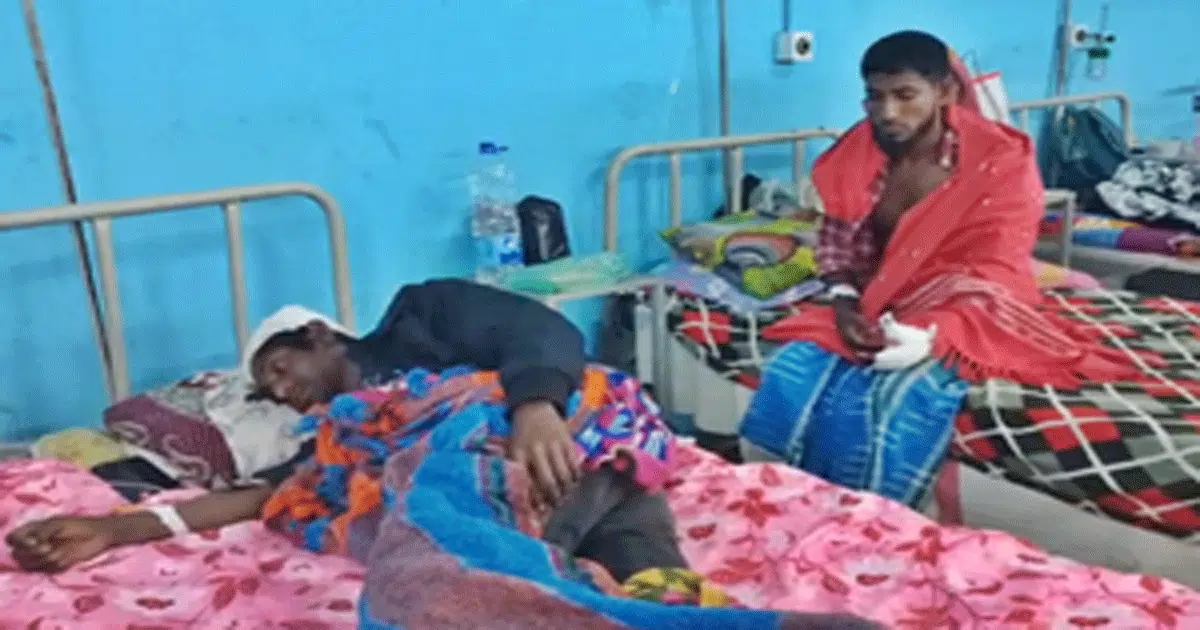Crime
Tension prevails along India-Bangladesh border after clash between farmers

Agartala, Jan 27: Tension prevailed along the India-Bangladesh border in Tripura’s Unakoti district on Monday after a clash between the farmers of two villages on the border of the countries, officials said.
The BSF and police officials separately said the villagers of India and Bangladesh clashed among themselves over the issue of farming in cropland in the border village of Hirachhara in Kailashahar Sub-division on Sunday evening.
According to the officials, two Indian farmers and a Bangladeshi cultivator were injured in the clash before the BSF troops intervened in the conflict. Local people said that Indian farmers — Karim Ali (28) and Zamir Ali (34), both brothers, were severely assaulted with sharp weapons and iron rods by a group of 10-12 Bangladesh nationals. The attack left them critically injured, with Karim sustaining deep wounds on his left hand and back while Zamir suffered head injuries.
Both are currently undergoing medical treatment at the Unakoti District Hospital, where doctors have indicated that Karim’s left-hand finger may need an amputation.
The incident occurred when the two brothers, who cultivate betel leaves and paddy on their land near the zero line of the border, had gone for farming activities on Sunday and found significant damage to their crops. They informed the matter to the Border Security Force (BSF) personnel posted in the area.
However, while returning home in the evening, they were threatened not to go to that area again for cultivation and then attacked by Bangladeshi nationals from the Murui Chhara area of Moulvibazar district (Bangladesh).
The attack occurred within Indian territory raising concerns about the safety of the Indian border villagers. Additional troops of the BSF have been deployed in the areas.
Sunday’s incident occurred within three weeks after Bangladeshi nationals allegedly attacked BSF personnel at the Maguruli border and attempted to snatch their firearms on January 7.
Meanwhile, Tripura Chief met Union Home Minister Amit Shah in Delhi on January 18 and handed over a letter to him on the construction of a big embankment along the border by Bangladesh.
“The Chief Minister in his letter to the Home Minister, highlighted the potential effect of the Bangladeshi embankment in Unakoti district and possible floods on the Indian side. The Chief Minister has urged the Home Minister to take up the matter with the Bangladesh government to take appropriate steps by the neighbouring country,” an official said.
Seeking the Union government’s intervention, the opposition Congress on Saturday organised a demonstration along the India-Bangladesh border areas in northern Tripura’s Unakoti district to protest against the construction of the embankment by the neighbouring country along the boundary. According to senior Congress leader and former Minister Birajit Sinha, who has been spearheading a stir against the controversial embankment, the Bangladesh government now unilaterally constructing an embankment on its land may endanger the district town of Kailashahar and border villages during monsoon floods.
Crime
Mumbai: Khar Family Alleges PAN Misuse After Karnataka GST Slaps ₹47.36 Lakh Dues Notices, Accounts Frozen And FIR Registered

Mumbai: Ramakant Gore, 45, a resident of Khar West who works as a recovery agent with a reputed bank, was shocked after receiving notices in the names of his wife and daughter from the Karnataka GST department, demanding payment of outstanding dues amounting to Rs. 47.36 lakh. The Gore family claims they have never conducted any business in Karnataka and suspects that their PAN card details were misused to register fake firms. Following a complaint, the Khar police registered an FIR on December 31.
According to the FIR, a GST arrears notice dated January 19, 2024, was received in the name of the complainant’s wife, Savita Gore, under the firm name M/s Gore Traders. Subsequently, on February 26, 2024, action was initiated against her SBI bank account due to the pending dues, leading to the freezing of her fixed deposit of Rs.6 lakh along with the remaining account balance. After the Gore family approached the Karnataka GST office, the account was later defrozen.
However, in September 2024, another notice was received in the names of M/s Vasant Traders and M/s Gore Traders. The notice bore Savita Gore’s purported signature, following which the account was once again frozen by the Karnataka GST department. In November 2025, the bank account of their daughter, Dhanashree Gore, was also frozen, and in December 2025, the family received a summons from the Income Tax Department. The Gore family has since submitted all relevant documents to the Income Tax authorities.
The family has alleged that neither they nor any of their family members have ever started or operated any business under the names Gore Traders or Vasant Traders. They claim that unknown persons misused their PAN card details to fraudulently register fake companies in Bengaluru. The family stated that they are undergoing severe financial and mental distress due to the incident and have demanded a thorough investigation and strict action against those responsible.
Based on the complaint, the Khar police have registered an FIR against an unidentified person under Section 318(4) (cheating) and other relevant provisions of the Bharatiya Nyaya Sanhita (BNS), along with sections of the Information Technology Act.
Crime
J&K Crime Branch files chargesheet in fake appointment orders case in Agriculture Dept

Srinagar, Jan 1: The Jammu and Kashmir Crime Branch on Thursday said it has filed a chargesheet against the accused in a case involving fake appointment orders in the Agriculture Department.
A statement mentioned that the Economic Offences Wing (EOW) of Crime Branch Kashmir has filed a chargesheet before the Court of Judicial Magistrate 1st Class, Chadoora, Budgam, against two accused persons in a case related to forged and fake appointment orders in the Agriculture Department, in an alleged attempt to cheat aspirants of government employment.
The statement said the Economic Offences Wing has submitted the chargesheet in connection with FIR No. 43/2021 registered under Sections 420/511, 467, 468, 471 and 120-B of the Indian Penal Code.
The chargesheet has been filed against Showkat Ahmad Hajam, son of Mohd Akbar Hajam, resident of Wagoora, Tehsil Chadoora, District Budgam, and Irshad Ahmad Ahanger, son of Ghulam Mohd Ahanger, resident of Ratnipora, District Pulwama.
According to the statement, the case originated from a communication received from the Deputy Director, Agriculture, alleging that a woman had attempted to join the Directorate on the basis of a fake and invalid appointment order.
It was reported that on November 30, 2019, the woman visited the Agriculture Department office with a photocopy of a purported official communication bearing No. Agri/ESstt-NG/2018-19/8451-53 dated November 22, 2019.
On verification, the communication was found to be fake and fictitious, as it had not been issued by the Directorate. Further scrutiny revealed that the appointment orders referred to in the communication — Order No. 385/Estt. of 2019 dated April 26, 2019, and Order No. 16/Estt. of 2019 dated January 29, 2019 — were also forged.
During the course of investigation, it was established that accused Irshad Ahmad Ahanger had obtained the forged communication from co-accused Showkat Ahmad Hajam.
The forged order falsely showed three persons as selected and appointed as orderlies in the Agriculture Department, Kashmir Division.
On the basis of the fake appointment order, one woman from Pathan area of Pulwama district was cheated and induced to believe that she had been legitimately appointed. Acting on this belief, she attempted to join the Agriculture Department, Kashmir, at Srinagar on November 30, 2019.
The investigation further revealed that the accused persons had entered into a criminal conspiracy to prepare and use forged appointment orders with the intention of cheating aspirants seeking government employment. Although no monetary transaction or wrongful gain or loss could be established during the investigation, the act constituted an attempt to cheat, thereby attracting Section 511 of the IPC, the statement said.
Accordingly, upon completion of the investigation, the chargesheet has been filed before the competent court of law for judicial determination, the statement added.
Crime
Mumbai: Man Arrested With ₹72,000 In High-Quality Fake Currency Near Dadar Station Ahead Of BMC Elections

Mumbai: In a major action ahead of the BMC elections, Mumbai Police’s Shivaji Park Police arrested a man in possession of high-quality counterfeit currency notes from the vicinity of Dadar Railway Station.
Police recovered fake currency notes with a face value of ₹72,000 from the accused. All the seized notes were in the denomination of ₹500 and were found to be of high quality. The arrested accused has been identified as Amruddin Sheikh (61).
According to police officials, there is suspicion that the seized counterfeit notes may have been smuggled into India from Bangladesh. Further investigation in this regard is underway.
Police have also revealed that the accused had previously used counterfeit currency worth several thousand rupees. Investigators are now probing where and how these fake notes were circulated. Further investigation is in progress.
-

 Crime3 years ago
Crime3 years agoClass 10 student jumps to death in Jaipur
-

 Maharashtra1 year ago
Maharashtra1 year agoMumbai Local Train Update: Central Railway’s New Timetable Comes Into Effect; Check Full List Of Revised Timings & Stations
-

 Maharashtra1 year ago
Maharashtra1 year agoMumbai To Go Toll-Free Tonight! Maharashtra Govt Announces Complete Toll Waiver For Light Motor Vehicles At All 5 Entry Points Of City
-

 Maharashtra1 year ago
Maharashtra1 year agoFalse photo of Imtiaz Jaleel’s rally, exposing the fooling conspiracy
-

 National News1 year ago
National News1 year agoMinistry of Railways rolls out Special Drive 4.0 with focus on digitisation, cleanliness, inclusiveness and grievance redressal
-

 Maharashtra1 year ago
Maharashtra1 year agoMaharashtra Elections 2024: Mumbai Metro & BEST Services Extended Till Midnight On Voting Day
-

 National News1 year ago
National News1 year agoJ&K: 4 Jawans Killed, 28 Injured After Bus Carrying BSF Personnel For Poll Duty Falls Into Gorge In Budgam; Terrifying Visuals Surface
-

 Crime1 year ago
Crime1 year agoBaba Siddique Murder: Mumbai Police Unable To Get Lawrence Bishnoi Custody Due To Home Ministry Order, Says Report












